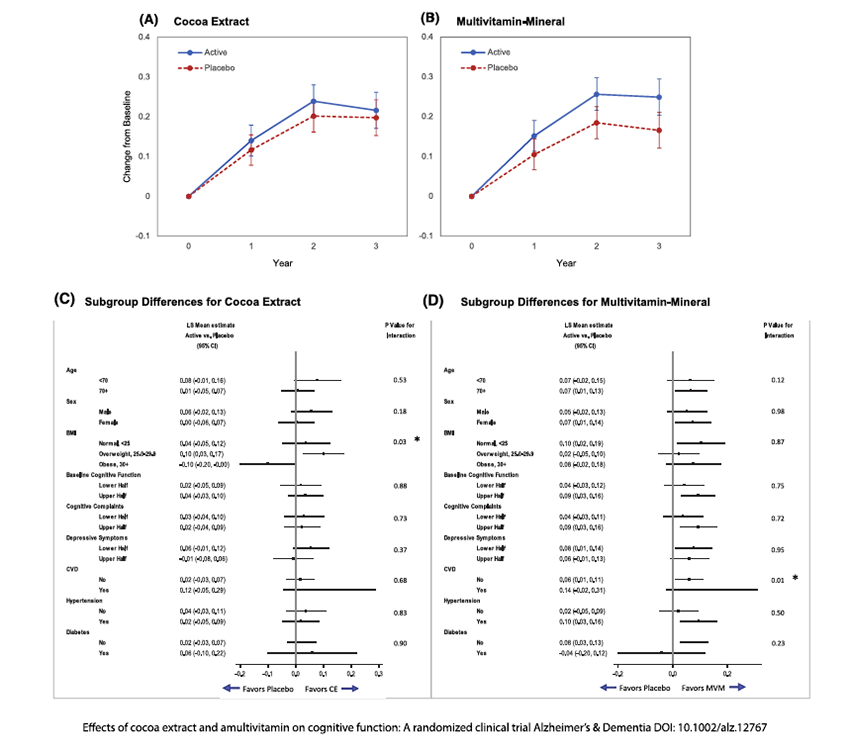The study asks whether simple dietary intervention, the daily use of cocoa or Centrum Silver, will slow the downward spiral of dementia. Why those two? Cocoa has a very high percentage of flavonoids which increase cerebral blood flow. Multivitamins contain a range of “micronutrients and minerals,” which may help those with deficiencies optimize their cognition. The findings have been mixed in both cases, and there are few, if any, long-term studies.
The researchers piggybacked this study into a larger cohort looking at cocoa and multivitamins' impact on cardiovascular disease and cancer. Thirty-six thousand individuals began the parent study; 21,000, or 60%, were randomized. Within this 21,000 cohort, 5,300 were offered a chance to participate in the cognition study, and 2,262 formed the basis of this research. Caveat 1 – your choice of the denominator, 36,000 or 5,300, will determine just how selective the cohort appears to be, but it is selective.
Demographics and risk factors were essentially identical across the four treatment groups. [1] Here is what they found.
Let’s break it down, starting with A and B. In the first two years, there was an improvement in cognitive scores in the placebo, cocoa, and multivitamin groups. This is, to a large extent, due to increased familiarity with the testing that was conducted by phone. The key result was the outcome in year 3. Here for those with the cocoa supplements, there was no difference from the placebo group, although we still see the impact of familiarity – the cognition is still better than baseline. For the multivitamin group, there was no additional improvement; the effect had “plateaued” and was persistently better than the placebo controls.
The Forest plots in C and D break down the impact of factors like age, gender, etc. As a reminder, horizontal lines touching the vertical imply no effect. We can ignore the cocoa group. The only group with a statistically significant improvement with multivitamins is those with pre-existing cardiovascular disease. As the researchers suggest, in other studies, individuals with cardiovascular disease have been found to be deficient in micronutrients, so there is a plausible reason for the improvement.
The improvement in cognitive function was primarily in episodic memory (remembering events in your past), with a much smaller gain in executive function (abilities to organize, abstract, multitask, social interactions, planning.)
Despite the efforts of the researchers to recruit underrepresented demographics, the study group was not reflective of America.
- 88.7% Non-Hispanic White
- 59.6% Female
- 88.1% Attended or graduated from college or pursued additional education after college
- Average BMI of 27, overweight but not obese. For context, 43% of this age group are obese
- 22.41 “metabolic equivalent” hours of exercise weekly. For context, roughly 40% of this age group exercise 2.5 hours weekly.
Caveat 2 – the participants were not reflective of what might occur when the study results were applied to a much broader and different population. A limitation that the researchers do acknowledge. This limitation was further exacerbated by the fact that those with missing data were more likely to be smokers, have diabetes, and have less education.
Does funding make a difference?
The researchers freely report funding by Mars, the candy people, for “infrastructure support and the donation of study pills and packaging.” Pfizer contributed the Centrum Silver. In the reporting on the study by Stat, the journalist notes that the Pfizer subsidiary had no role in funding the research or shaping its design, presumably because the Pfizer product demonstrated some efficacy. Oddly, no such comment was made about the funding by Mars, whose involvement was greater. Does this mean that we should be concerned about conflicts of interest only when the results favor a company?
“You could score a point better when you take the test a year later, and it’s statistically significant. But does that translate into anything meaningful in a person’s life?”
- Jeff Kaye, MD, Director, Layton Aging and Alzheimer's Disease Center, Oregon Health & Science University
Of course, Dr. Kaye focuses our attention on the real question for which there is no answer. The researchers could not say the same directly, so they used some modifying adjectives, which I highlighted.
“COSMOS-Mind provides the first evidence from a large-scale, long-term, pragmatic RCT to suggest that daily use of a safe, readily accessible, and relatively low-cost MVM supplement has the potential to improve or protect cognitive function for older women and men.”
Ten or eleven cents a day seems a small price to hedge your bet on potentially protecting your cognitive function; if you are over 65 and represented by the studied population. For the rest of us, and that is the majority, we still have no evidence of the value of multivitamins, irrespective of their cost.
[1] Cocoa + placebo, Placebo + Multivitamin, Placebo + Placebo, Cocoa + Multivitamin
Sources: Effects of cocoa extract and a multivitamin on cognitive function: A randomized clinical trial Alzheimer’s & Dementia DOI: 10.1002/alz.12767
Daily multivitamins improved the brain function of seniors in a trial — but plenty of questions remain Stat





